![]()
"The preachings of religion make a person dependent on priests, temples, idols, blind faith, and dogma"

"The Upanishadic literature is not a religious scripture and is free from dogma and doctrines. It is not a part of any religion but is a philosophy for all times and for all. This philosophy does not oppose any school of thought, religion, or interpretation of the scriptures, but its methods for explaining its concepts are unique. The Upanishads should not be confused with the religious books of the East; there is a vast difference between the philosophy of the Upanishads and the preachings of any of the religious scriptures of the world. In religion and religious books, there is little practicality and much theory. One is not supposed to interpret religious sayings, for there is always the possibility of distortion. For this reason, their explanation is delegated to a few teachers and preachers who are considered to be the custodians and authorities on these scriptures. Common people do not have the opportunity to study the scriptures in depth, but instead must rely on the interpretations of such preachers who may show no signs of enlightenment and yet have influence over the conscience of the masses. Whether these clerics actually know and practice religious truths or not is never questioned, and those who do question are considered to be atheists and heretics. Intellectual bankruptcy such as this leads the masses to blind faith and causes many wars and divisions in the human race. For the younger generation today, however, empty religious preachings are not fulfilling, for the modern mind likes to use reason and logic before it accepts anything as truth.
With the development of science and technology, there has arisen a provocative mind that questions the existing religions and their role in society. The modern mind has started questioning, but the search for truth still remains obscured because scientific explorations are directed externally and not toward the inner levels of life. Science and technology are materially oriented, but a human being is not matter or energy alone. Most human resources are currently being directed to matter, mind, and energy, but little effort is being made toward the expansion and exploration of human consciousness. Modern psychologists are scratching the surface of mental life in order to eliminate superficial human problems in the external world, but the vital questions of life are not yet resolved, for they are beyond the grasp of materially-oriented thinking.
The Upanishads prepare, inspire, and lead the student to know and realize the Ultimate Truth. First of all, the philosophy of the Upanishads frees one to cast away his intellectual slavery to blind faith, superstitions, sectarian beliefs, and dogmas. Then it helps one to expand his individual consciousness to Universal Consciousness; thus one's personality is transformed, and one becomes a universal being. An individual is essentially Brahman, or identical to Universal Consciousness, and direct realization of that truth is called enlightenment. Current religious preachings, on the other hand, are enveloped in a thick layer of dust, and they need a complete shakeup. Religion needs modification to suit the needs of modern man. There seem to be two options for humanity: either it stops listening to the preachings, starts seeking the truth, and rejoices in the broader awareness of truthful living; or it continues to follow religious dogma, fails to attain the next step of civilization, and remains in ignorance and suffering. Upon careful analysis of the living and thinking structure of modern human society, anyone can see that the process of human evolution is in a state of stagnation. All current research is directed to the external world; thus the human goal has become materially oriented and superficial. Human beings today have nothing better to live for than acquiring many comforts. These may be necessities and means, but because attaining them lacks a goal or aim, they create a hollow and empty philosophy that brings only strain and stress.
The preachings of religion make a person dependent on priests, temples, idols, blind faith, and dogma, and dependence is a habit of the lower mind. Such crutches may be useful at a certain stage for some people, but they do not lead one to Ultimate Truth. A dependent mind is not free, and without freedom, enlightenment is impossible. Religious dogmas are full of beliefs and myths that do not satisfy the human intellect and that bind believers to a narrow view of life and human potential. Such preachings instill more fear than love in the hearts of the masses. Religion either promises salvation or threatens the tortures of hell, but it does not provide sound solutions to the hellish problems and situations that plague human beings here and now. Nor does it satisfactorily explain life before birth or after death. One of the main themes of Upanishadic philosophy, however, is to attain a state of fearlessness, cheerfulness, and self-confidence. In addition, the Upanishads lead the student to know life in its totality. Knowledge of life before birth, knowledge of now, and knowledge of life hereafter can be realized through the methods given in the Upanishads. The Upanishads provide systematic methods for self-training, self-transformation, and self-enlightenment. They lead aspirants 'from the unreal to the Real, from darkness to Light, and from mortality to Immortality.'
The founders of religion were selfless and sincere—great seers, sages, and spiritual leaders. But as religions grew, the teachings of the founders were lost, and only the preachings of their selfish followers remained. Because of this, the great religion of the East was reduced to the narrow faith and beliefs of Hinduism, Brahmanism, Buddhism, and Jainism. Practical Christianity also disappeared forever, and there remained only churchianity. History shows that religionists do not actually encourage one to follow in the footsteps of the founder of their religion by practicing his teachings, but, rather, they instruct their followers to worship the image or the name of the founder of the religion through priests. Many religious leaders who claim to know God are more miserable than those they attempt to lead; they suffer from trite egoism, jealousy, and selfishness. The light of truth cannot shine through such barriers. Thus, the blind are leading the blind. The philosophy of the Upanishads is not bound by a single founder or religion, however, and it is as applicable today as it was thousands of years ago, and it will be so for as long as humanity exists.
Religious dogma sets forth rigid commandments presented in terms of good and bad, black and white, with no explanations to support them. In the long run, these create serious overreactions and overcompensations in the human mind. All the books from the different religions repeat set laws of conduct in the same way, yet each of these religions claims that it is superior to all the others. Religious beliefs may offer solace to lower, primitive, less educated, and uncultivated minds, but they have nothing to offer those who already know what to do and what not to do, and who are seeking logical solutions to life's questions and guidance in learning how to be. In today's so-called civilized society, the moral laws preached by the leaders and preachers seem to be incomplete. Such teachings and preachings are, therefore, misleading and are a mere waste of time and energy. As long as the preachers, police, and army have to guard the morality of human beings, this cannot be considered to be a civilized society. The moral custodians of today's world are actually atomic weapons, not the laws given in the religious books of the world. Thus, material forces are guiding the destiny of human life. Human beings have lost their center of equilibrium and live without any sense of equality, love, and mutual understanding. Religions do not teach unity but create divisions in human society. The Upanishads do not impose commandments, but, rather, offer practical guidelines and methods for self-discipline and self-unfoldment. The steps for inner growth contained in the Upanishads can be incorporated into one's individual lifestyle and can help one examine the accomplishments of one's spiritual practice (sadhana).
Religions can be divided into two groups. One group follows the prophets but does not believe in inner experience. These religions are actually cults and are full of rituals, fear, guilt, and fanaticism. The other group of religions has a vast spiritual literature, but the followers are exploited by priests who involve them in rituals without explaining their purpose or establishing their validity. Therefore, both types of religion have been exploiting humanity and, thus, crippling human efforts to evolve and attain the next step of civilization in which people will learn to live with others in mutual understanding and love. The vast majority of the human population practices religious rituals in some way or other, but no ritual exists that can eliminate the ignorance that causes pain and misery.
Religions have two great weapons to conquer the hearts of their followers: faith and grace. The way faith is described in religious scriptures is not actually faith at all, but is blind belief based on ignorance and rigidity of tradition. Tradition and truth are entirely different. One is mingled with customs, systems, cultures, habits, thoughts, feelings, and desires, and the latter is a search for the Ultimate Reality. For attaining truth, everything the aspirant has, including thoughts, deeds, and speech, becomes a means for attaining truth; while in tradition, all means are used for the sake of convenience, pleasure, and gratification. Religionists and their faithful followers are afraid to analyze the very nature of their faith. Thus, one is lost in a morass of religious fanaticism. Faith that does not recognize the faculty of reasoning and that has not been filtered by reasoning is based on blind beliefs that remain unexamined. They thus unnecessarily create doubts, and when doubts are not resolved, such faith disappears. Blind faith, being empty and devoid of any real reason or fact, is often found wanting when one has a problem and expects to find a strong basis that will support and carry him through difficult times. Then one finds, instead, nothing to hold on to or anchor oneself to. Because of this weakness in religious faith, religious dogma says that faith is a gift from God, and that if one questions it, then it might vanish and be lost. True faith is supported by pure reason, which is attained through thoughtful analysis of life. Following the extended practice of sadhana; and purification, a few fortunate seekers realize and know the nature of the world as it is and also experience the all-pervading truth that enlightens the' dark chamber of the aspirant's heart.
The Upanishads say that to rise above and reach a state beyond and to know the real nature of the transitory world, one must cultivate logic and pure reason and make sincere efforts with the help of deep contemplation. They declare, 'Only that which is good and auspicious in Upanishadic literature should be revered and brought into practice, and the rest should be left behind for further introspection.'
In religions, grace is considered to be a gift bestowed on the seeker, either as a reward for following the commandments or by mere whim. Thus, the bestowing of blessings serves as a bribe to make one conform, and it implies that the seeker is helpless to succeed by his own effort. There is often little sense of individual mastery but rather a reliance on the favors of fate or the judgments of the preachers. Fear and insecurity are the logical results.
Today religion has degenerated so much that it has become totally materialistic. No matter how good a heart one has, if one is not on the list of followers and supporters of the church, then one's faith does not have any value in the eyes of religionists. Religious leaders and preachers who claim to be custodians of faith and grace sell faith to blind followers for wealth and favors, and, thus, religious materialism takes the place of spiritual sincerity.
Various schools of theology argue over the semantics and meaning of the verses and parables of religious scriptures and never reach any shared interpretation. In order to confront the question of life, one must remain unaffected by religious dogma, doctrines, and superstition, and one must make use of one's finest instrument, the intellect. The Upanishads do not encourage students to depend on the sayings of the scriptures; rather they inspire them to be self-reliant and discriminating. Religious dogma encourages people to follow the canons of a particular sectarian belief that is limited to a specific group. Thus, instead of expanding universal brotherhood, it further divides humanity and pollutes human feelings with biases and prejudice. Upanishadic philosophy is the expression of supreme knowledge directly experienced by great sages and is not confined to caste, color, society, or nation.
Today the world lives under the law of fear, trembling with doubts and uncertainty. No prophet of the law of love is to be found, and one finds no leaders who give object lessons, sympathy, and good will, and who identify with the true happiness of individuals and nations and the highest good of mankind. Many religious leaders exist, but it is amazing to note how tired and confused they are. 'Rise, awake, and gain knowledge'—this Upanishad declares that one should not act like a gigantic inert person who is dumb and desolate, who knows not the meaning of life and the universe. All human beings have the essential potentialities to understand and direct their life streams toward the ocean of bliss. The message of Upanishadic philosophy extends good will to the whole of humanity, saying, 'Let all of mankind be happy; let all of humanity attain physical, mental, and spiritual health; let all receive and enjoy auspiciousness; let no one experience pain and misery here and hereafter.”
Swami Raja, Enlightenment Without God
Himalayan Inst Pr (June 1982) pp. 11-18

"Every Old Testament prophet railed against the making of images. In many passages, idolatry seems to be an apostate's most heinous crime. We do not read that Jesus disparaged artists. Jesus angrily denounced scribes and hypocrites who, He believed, pander to the law. While there are other reasons for Jesus' disdain, 'scribes' are people who write and He uses the term along with 'hypocrites' to insult the learned talmudic scholars who called themselves Pharisees. When the Pharisees rebuked Him because His disciples did not wash their hands before eating bread as demanded by the law, Jesus admonished them for worrying about ritual instead of truth.
The scribes and Pharisees...put heavy loads of the Law upon men's shoulders, but they will not lift a finger to move them....They...like the best places at dinners and the front seats in the synagogues.... But alas for you hypocritical scribes and Pharisees...you blind guides...blind fools! You let the weightier matters of the Law go--justice, mercy, and integrity....Outwardly you appear to men to be upright, but within you are full of hypocrisy and wickedness.... You are descended from the murderers of the prophets. Go on and fill up the measure of your forefathers' guilt! You serpents! You brood of snakes! (Matt. 15:1-20) (*)
(*) The invective in this passage has cast doubt on its authenticity, but when viewed with other passages believed to be authentic, it supports Jesus' disdain for legalism.
Jesus drove the Pharisees to exasperation. How could a Jew not be interested in the Law? Jesus, however, recognized that excessive lawyering over the years had overlaid the Torah with an obscurantist veil. It kept lawyer-scholars fully occupied, forcing ordinary folk to seek advice from men trained in legal arcana as to how to live a righteous life. Jesus knew that excessive legalism empowered a select, priestly class of men. He proclaimed to His followers that He was the Truth and no person or written document should stand between His truth and its seeker. (p.218) Like Antigone, He reminded His disciples that they must answer to a higher calling. He entreated His followers to let go of all their preconceived notions. Shedding society's conventions would allow them to find the living knowledge that cannot be legislated.
Laws represent order and are among the most masculine manifestations of alphabet cultures. Laws force those compiling them to use language in a precise manner to avoid misunderstandings. Jesus did not speak the language of lawyers, nor did He engage in philosophers' rational debates. Jesus prescribed no legal system to help humans govern themselves: His was a ministry of the heart and soul. Instead of the lexicon of the ruling class, He used poetry to couch His pronouncements in visual and emotional aphorisms and parables easily recalled. As I discussed in Chapter 3, aphorisms and parables, rich in metaphor, originate in the right brain.
Money played no role in Jesus' life of the spirit; He declared that possessions were irrelevant, and argued against the evils of wealth. He said, For what is a man profited, if he should gain the whole world, and lose his own soul? (Matt. 16:26). In one of the few violent acts of His ministry, Jesus overturned the tables of the moneychangers outside the Temple.”
The Alphabet Versus The Goddess (The Conflict Between Word and Image),
Leonard Shlain, Penguin Compass, p. 217-218
Is this about Religion?
“Truth is beyond religion. It is about being. It promises knowing. It ensures becoming that which is eternal, infinite and absolute.
Religions preach part of this truth only. Therefore they are incapable of transforming you. The partial truth, traps you in partial lies.
The journey to the Self cannot be about religion because religion is outside of you.
The journey to your Self is towards the inner mystery. It leads you to your own consciousness. It leads you through awareness and to awareness.
You see, learn and know your own Self. There is no alien search, therefore ritual, scriptures and preachers only bind you to yet another alien self.
Why? Religion preaches alien means. It asks you to follow the path of a Prophet or Messiah you never met, follow the edicts said to be laid down by them in books not written by them. Most importantly religion's claim to your soul usually comes from the accident of birth which placed you in a family, where along with other identifications, there is a religious lineage.
Religion is therefore at best a social identity completely at variance to the Path of your Self which is based on dissolving the artifice of all identities. The Self which KNOWS truth, therefore no borrowed truths will do.
This is why religion is no longer about spirituality. It is the game of power and numbers. The spiritual must be about the spirit. Yours! And to know your spirit you have to first embark on a journey of finding it. It can only be therefore truly discovered within you.
The priest and padres who propound, have not known this state themselves. If they had, they would not speak as they do. Discriminating sexually, racially, on gender and spiritually. They speak thus, calling one the son of God and all others pagans, one the only prophet and so on. Knowing would not allow them to speak thus. They parrot scholarly lies, because belonging to churches and spiritual institutions gives them power. The same powerlessness that drives you drives them. You are still truthful enough, and therefore salvageable, because you have not chosen to enter the game of spiritual manipulation just to free yourself of the demon of powerlessness. They have compromised the greatest realm of truth and love to gain power over confused lost souls.
That's all that Churches, Temples and Mosques offer; manipulation of fear. They spend their time ruling on sin and virtue so that the fear in you grows sufficiently to seek their help. A congregation is therefore a question of numbers not enlightened beings. Conversion is a game of power and size, not truth and inspiration. Where does truth or light figure in any of this?
It is important therefore to begin to ask questions. The right questions. You are searching for a critical Path. Perhaps the most precious thing you will ever seek. Let the journey begin with truth. Ask yourself if the practice of the religious was so virtuous and exemplary of God's order why are we forever hearing stories of priests as paedophiles, rapists, children are being sexually abused by mullahs and padres, religion (spiritually sanctioned hate to be more precise) is being offered as the justification for heinous acts such a September 11th, airline blow-ups, unending wars between Israel and the muslim world, the longest war in history- the 300 year war was on religious intolerance, riots, cross-border terrorism, jihad calls against nations, people and individuals. This is the breeding ground and theatre of religion. A theatre filled with discrimination, violence and intolerance. Can the highest Truth of the Self, which promises wonder, liberation and infinite love ever flower in such a space?
Fear cannot be the reason for searching truth. And religion specializes in fear. Are you a good Hindu, Muslim or Christian is their question. Are you an enlightened being is not?
Your answer will decide where and how you will search.”
Is this about Religion?
https://www.ifsha.org/healing/religion.htm
Web May 17, 2012
Sadguru and the Holy Spirit — R. S. McGregor
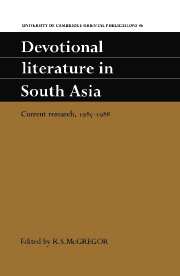
"Sant Ramdaa (1608-81), a Maharashtrian mystic akin to the Varkari movement of Pandharpur, not only influenced Sivaji, the founder of the Maratha kingdom, but gave spiritual and moral vigour to the thousands of Marathas who helped Sivaji to establish Hindu self-rule (svarajya). Ramdas has considerable influence even today on the social and political life in Maharashtra. In this paper I shall examine the concept of the Sadguru (divine guru) in his compositions, and I would like to point out how this concept is close to that of the Holy Spirit that dwells in the heart of men. Therefore I will make some references to the spiritual growth of Ramdas, as well as to ... (continue)
All About Gurus — Dr. R. Prasad
"The contact of great souls who have realized the truth is very helpful. Reading scriptures, giving charity, and doing Saadhanaa alone may not give God-realization. A God-realized soul can awaken and kindle another soul. But, no guru can give a secret formula for Self-realization without His grace. It is said that human birth, faith in God, and the help of a sadguru come only by His grace. The Vedas say: The one who knows the land, gives direction to the one who does not know, and asks for it (Rigved 9.70.09). One has to complete the journey with his or her own efforts. One has to row his or her boat through the turbulent waters of this world. People discover the truth by their own efforts. Krishnamurti said: 'The precepts of Truth are essentially ...” (continue)
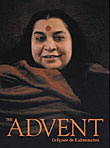
WHAT IS TO BE DONE?
So now, O sons of the thought, listen to Me, to the speech of The Mother of your mercy, for you have become worthy of the mystery hidden from the beginning of the Aeons, so that you may receive it.
- TRIMORPHIC PROTONNOIA,
GNOSTIC TEXT FROM THE NAG HAMMADI LIBRARY.
Shri Mataji Nirmala Devi says: "You cannot know the meaning of your life without being connected to the power which created you.” Villagers in India are not rejecting electricity because the man who discovered it, Thomas Edison, was an American foreigner. Are we going to ignore spiritual progress that results from discoveries made by an Indian woman? Can we accept that this is the age of cross-cultural fertilization in our global village? We need to dwell on this. Today, Shri Mataji's enormous contribution is being increasingly understood and her method has brought to spiritual knowledge the principles of scientific enquiry. Her work on Self-realization includes both the laying down of a scientific hypothesis and the verification of the hypothesis through experimentation. Self-realization is a phenomenon that happens and moreover, the experience of it is easily communicated.
This exceptional teacher has revealed in the mid-1970's a practical access to spiritual transformation. It relies on the spontaneous (sahaja) activation of our hitherto untapped spiritual potential. Her method has been trendsetting; today, she is a recognized spiritual figure worldwide whose message is focused on en masse Self-realization. For Shri Mataji, as for so many philosophers before her, the actualization of the Spirit within us is the goal of the human adventure. But she sees it in the most practical terms. "For what are you preparing my children, what are you seeking? It is your own growth that is important to you. Not what others are doing. What matters to you is your own development.”
The state of the condition of our inner system, our behavior, relationships, mode of interactions with people depends on a complex and subtle coding stored in our chakras. Before the happening of realization, we are of course unaware of this, and we simply undergo different mental states and nervous conditions without understanding how or why they arise. We act and react but we are not in full control of ourselves.
Shri Mataji asserts that we have already within us an instrument ready to be awakened, to switch us into a deeper understanding of reality. Its purpose is to deliver our transformation, the access code indeed to our higher consciousness of which it was said in parabolic terms: Verily, verily, I say unto thee, except a man be born again he cannot see the kingdom of God. Except a man be born of water and the Spirit, he cannot enter in the kingdom of God. That which is born of the flesh is flesh; and that which is born of the Spirit is spirit.” (John 3:3.5.6).
The psychosomatic and spiritual instrument (yantra), through which we experience our second birth, is not an arbitrary structure and all the code seekers can gradually learn and use the corresponding inner technique (tantra). It was built and pre-positioned in us for a purpose.
In other words, what is to be done is to obtain Self-realization. The possibility for humankind to get Self-realization is a threshold in the evolutionary process. It relies on the spontaneous activation of untapped spiritual potential. Self-realization is the moment when we can perceive directly this divinity within ourselves and connect with the Whole.
Gregoire de Kalbermatten, The Advent
The Life Eternal Trust Publishers, 1979, pp. 168-70.
10 TRENDS OF THE 21ST CENTURY: THE NEW MILLENNIUM RELIGION

“A new major religion, on a scale to rival any of the great world religions from Islam to Christianity, is beginning to take shape even before the new millennium turns. Like those religions before it, the yet unnamed new millennium religion will configure the minds of individuals, form new institutions, and help direct the course of history. The signs of the new religion ... (continue)
The Jewish Temple rituals (and the present day SY rituals)
March 24, 2017
Yahoo forum post # 18271
Note: By reading this extract of ancient Jewish temple rituals and those opposed to it, we can make a comparison between the present Sahaja Yoga rituals and those opposed to it. Every criticism against the priests can be used against the SY priests who have made the use of vegetables, water, clay pots, cotton strings, water, fire, candles etc. to cleanse themselves and be worthy of salvation. Some have not been able to cleanse themselves even after 30 years! Go figure! - jagbir
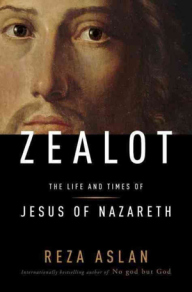
PART I PROLOGUE: A DIFFERENT SORT OF SACRIFICE
Help with the description of the Temple of Jerusalem and the sacrifices therein comes from a variety of sources as well as from my frequent trips to the Temple site. But a few books were particularly helpful in reconstructing the ancient Jewish Temple, including Martin Jaffee, Early Judaism (Bethesda: University Press of Maryland, 2006), especially page 172-88; Joan Comay, The Temple of Jerusalem (London: Weidenfeld and Nicolson, 1975); and John Day, ed., Temple and Worship in Biblical Israel (New York: T&T Clark, 2005).
Instructions for the Temple's four-horned altar were given to Moses while he and the Israelites rambled across the desert searching for a home: "And you shall make the altar of acacia wood. And you shall affix horns upon its four corners so that it shall be horned; and you shall overlay it with bronze. And you shall make pots for receiving its ashes, and shovels and basins and forks and fire pans; all of its vessels you shall cast in bronze. And you shall make for it a grating, a net made of bronze; and on the net you shall affix four bronze rings to its four corners. And you shall place it under the edge of the altar, so that the net extends halfway down the altar. And you shall make poles for the altar, poles of acacia wood, and overlay them with bronze. And the poles shall be inserted into the rings, so that the poles shall be on the two sides of the altar when it is carried. You shall make it hollow with boards, as it was shown to you on the mountain. Thus it shall be done" (Exodus 27:18).
What does it mean for the Temple to be the sole source of God's divine presence? Consider this: The Samaritans denied the primacy of the Temple of Jerusalem as the sole place of worship. They instead worshipped God on Mount Gerizim. Though this was essentially the only religious difference between the two peoples, it was enough for the Samaritans not to be considered Jews. There were other places of sacrifice for Jews (for instance, in Heliopolis), but these were considered substitutes, not replacements.
For more on Judea as a "Temple-State," see H. D. Mantel in "The High Priesthood and the Sanhedrin in the Time of the Second Temple," The Herodian Period, ed. M. Avi-Yonah and Z. Baras, The World History of the Jewish People 1.7 (Jerusalem: New Brunswick, 1975), 264-81. Josephus's quote regarding Jerusalem as a theocracy is from Against Apion, 2.164-66. For more on the Temple of Jerusalem as a bank, see Neill Q. Hamilton, "Temple Cleansing and Temple Bank," Journal of Biblical Literature 83.4 (1964): 365-72. A very concise breakdown of the Temple's revenues can be found in Magen Broshi, "The Role of the Temple in the Herodian Economy," Jewish Studies 38 (1987): 31-37.
The Qumran community rejected the Temple of Jerusalem for having fallen into the hands of the corrupt priesthood. Instead, it saw itself as a temporary replacement for the Temple, referring to the community as the "temple of man/men," or miqdash adam. Some scholars have argued that this is why the Qumranites were so interested in ritual purity; they believed that their prayers and lustrations were more potent than the rituals and sacrifices in Jerusalem, which had been tainted by the Temple priests. For a detailed discussion of the phrase "temple of man/men" at Qumran, see G. Brooke, Exegesis at Qumran: 4QFlorilegium in its Jewish Context(Sheffield, U.K.: Sheffield Academic Press, 1985), 184-93; D. Dimant, "4QFlorilegium and the Idea of the Community as Temple," in Hellenica et Judaica: Hommage a Valentin Nikiprowetzky, ed. A. Caquot (Leuben-Paris: Editions Peeters, 1986), 165-89.
It is Josephus who famously refers to the entire priestly nobility as "lovers of luxury" in The Jewish War, though he was not alone in his criticism. There is a similar criticism of the priests in the Dead Sea Scrolls, where they are called the "seekers of smooth things" and those who are "flattery-seekers.”
There is a wonderful description of the high priest in the famed Letter of Aristeas, written sometime around the second century B.C.E., a translation of which appears in the second volume of James H. Charlesworth, ed., The Old Testament Pseudepigrapha (New York: Doubleday, 1985), 7-34. Here is the excerpt: "We were greatly astonished, when we saw Eleazar engaged in the ministration, at the mode of his dress, and the majesty of his appearance, which was revealed in the robe which he wore and the precious stones upon his person. There were golden bells upon the garment which reached down to his feet, giving forth a peculiar kind of melody, and on both sides of them there were pomegranates with variegated flowers of a wonderful hue. He was girded with a girdle of conspicuous beauty, woven in the most beautiful colours. On his breast he wore the oracle of God, as it is called, on which twelve stones, of different kinds, were inset, fastened together with gold, containing the names of the leaders of the tribes, according to their original order, each one flashing forth in an indescribable way its own particular colour. On his head he wore a tiara, as it is called, and upon this in the middle of his forehead an inimitable turban, the royal diadem full of glory with the name of God inscribed in sacred letters on a plate of gold ' having been judged worthy to wear these emblems in the ministrations. Their appearance created such awe and confusion of mind as to make one feel that one had come into the presence of a man who belonged to a different world. I am convinced that any one who takes part in the spectacle which I have described will be filled with astonishment and indescribable wonder and be profoundly affected in his mind at the thought of the sanctity which is attached to each detail of the service.”
Reza Aslan, Zealot: The Life and Times of Jesus of Nazareth
Random House (July 16, 2013) pp. 231-33
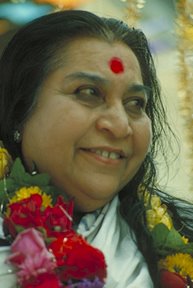
That's why Mohammad Saheb has said, 'Don't do any worship of any idol,' because these idols are created by human beings who are not authorised to do that. They are not swayambhus. They are not created by the Mother Earth but are copied by people who are just wanting to make money out of them. So that's, how any idol you get from the shops need not be worshipped. it's not to be worshipped: any idol whatsoever.
So whatever is not there, we should not worship because it's made by somebody who has very bad vibrations, who is a cheat, who is very cunning and thinks no end of himself. With such a person if you buy a Shri Ganesha it's going to harm you, it's not going to help you. You can have it for decoration in the house but not for worship. There is no photograph of real Shri Ganesh, no photograph so far.'
The Paraclete Shri Mataji
Shri Ganesha Puja, 'We must respect the Mother Earth'
Cabella Ligure, Italy—September 25, 1999
.jpg)
QM: 'That is He is saying to us, 'Don't make Me an idol, make Me the Ideal.''
I: 'He is saying that Christ said, 'Don't make Me an idol, make Me the ideal.''
Shri Mataji: 'That's true. You see, if you now get your realization you will understand Him much better. You will do full justice to Him and you'll recognize Him also and you'll recognize Me. You never recognize. None of you could recognized any one of the incarnations who came on this Earth, and how we tortured them and troubled them. But now after realization, through your vibrations you can recognize because if Christ comes, you will see, the vibrations in your hand will increase tremendously.'
The Paraclete Shri Mataji
Radio Interview, Sydney, Australia—March 31, 1981.
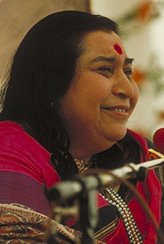
So they created another extreme religion out of it saying that?nothing?should be worshipped! But it is said, 'Whatever is reproduced by the Mother Earth.'?So there are so many such things all over the world which are created by the Mother Earth. So they should not be worshipped by?reproducing?them and making images out of them.
When such a prophet died saying that, 'This should not be done, one should not worship images,' the other side of it started ' the extreme! Going to the extreme that there should be?no worship?even if the Mother Earth has created. So, all the human beings were divided into [different] extreme conditions.'
The Paraclete Shri Mataji
Public Programme,Vishuddhi Chakra, New Delhi, India—February 2, 1983.

Shri Mataji "Now you have to be born again does mean that you certify yourself 'I am born again'. Self certificate, you can call it 'I am born again', but you don't become. What is so special if you are born again, what should be so? The human awareness at this level is just ready to be born again.
Now in Sanskrit the word for a bird is Dwijaha, means born again, and also for a Brahmin who is born again. But those who call themselves Brahmins are not Brahmins. They just call themselves Brahmins. Have they come to know the Brahma, the all pervading power of God? Those who say they are born again, should feel the all pervading power of God around them, if they cannot feel it they are not born again. So all these self certificates are deception, self deception and deception of others, is just a money making process.”
The Paraclete Shri Mataji
Disclaimer: Our material may be copied, printed and distributed by referring to this site. This site also contains copyrighted material the use of which has not always been specifically authorized by the copyright owner. We are making such material available to our readers under the education and research provisions of "fair use" in an effort to advance freedom of inquiry for a better understanding of religious, spiritual and inter-faith issues. The material on this site is distributed without profit. If you wish to use copyrighted material for purposes other than “fair use” you must request permission from the copyright owner.